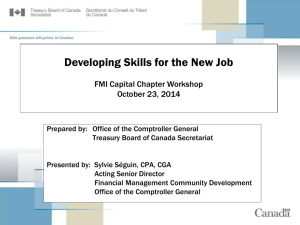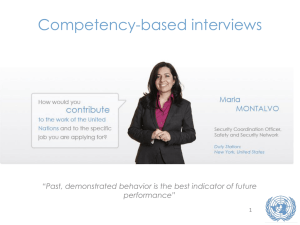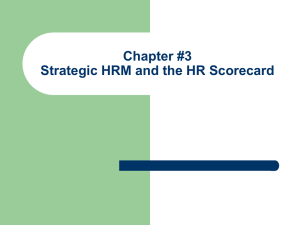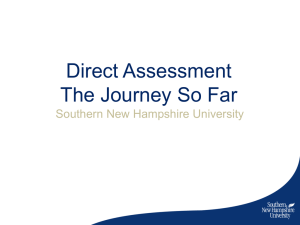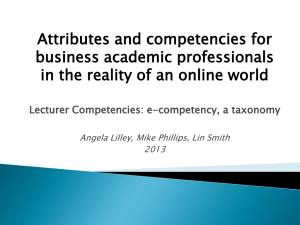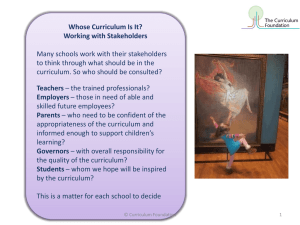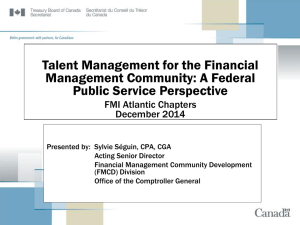Key Competencies for the Financial Management Advisor
advertisement
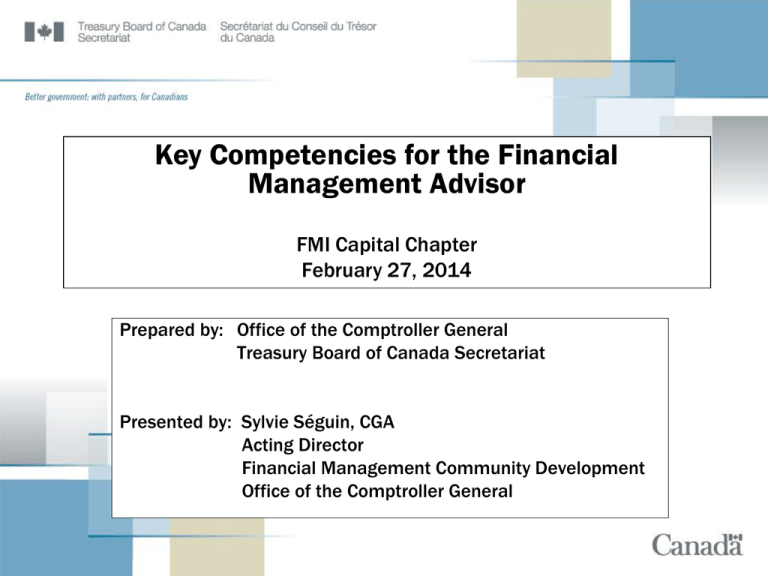
Key Competencies for the Financial Management Advisor FMI Capital Chapter February 27, 2014 Prepared by: Office of the Comptroller General Treasury Board of Canada Secretariat Presented by: Sylvie Séguin, CGA Acting Director Financial Management Community Development Office of the Comptroller General Learning Objectives • What are competencies? • The Ideal Financial Management Advisor (FMA)? • What other tools are available to support you in managing your career? 2 What Are Competencies? Defined as… The characteristics of an individual that underlie performance or behaviour at work* They are: Measurable Observable “Can do” + (Skills, knowledge) “Will do” (Behaviour) *Source: Public Service Commission = Competencies 3 FI Competency Dictionary Functional competencies •Accounting Operations •Planning and Resource Management •Financial Policies •Financial Systems Behavioral competencies •Oral and Written •Engagement Communications •Management •Risk Management •Negotiation/ Persuading •Values and Ethics •Strategic Thinking - Excellence - Action •Management Excellence - People •Management Excellence - Finance Analysis •Strategic Thinking Ideas 4 Successful Performers Poor Performer Successful Performer Far Exceeds Expectations Successful performers: – Display professional behavior in a consistent manner; – Fulfill job requirements by being productive and effective at their work level; – Perform at or above the job level (quality, timeliness and responsiveness) as a matter of course; and – Use particular approaches and demonstrate specific behaviors that facilitate the meeting of objectives 5 The Ideal Financial Management Advisor (FMA) and Key Competencies 6 The Ideal FMA Behaviours Behavioural Competencies • • Tells story behind the numbers Asks the right questions • • • • • Asks the right questions Business oriented Strategic advice oriented Understands the big picture Agent of change • Client focus • Engagement • Understands risk tolerance and takes into consideration risk appetite • Risk Management • • Trustworthy Flexible • Oral and Written Communications Strategic Thinking – Analysis Strategic Thinking – Ideas • • “Leadership” 7 The Ideal FMA Behaviours • • • • • • • Balances strategic advice Monitors projects Alignment of roles Ensures policies are respected Supports/facilitates decision making Deliver implement Functional Competencies • Planning and Resource Management 8 Barriers •Perceptions of Finance Function: –seen as: » being focused on itself » being rule-bound » the centre for control » process oriented vs. results oriented » adding cost to running programs (i.e. overhead) 9 Learning & Development Tools • • • • • • FI to CFO Career Path Welcome to Pages Learning maps FI core curriculum Managers Guide to Competency-Based Management Self assessment in the Employee Guide to Competency-Based Management • Available at: www.gcpedia.gc.ca/wiki/Financial_management_community 10 FI to CFO Career Path 11 FI to CFO Career Path – cont’d 12 FI to CFO Career Path – cont’d 13 Welcome to Pages 14 Welcome To Pages • Available for each FI level in the career path. • Provides guidance to FI’s on how to best position themselves to meet the requirements of their position and for growth within the FM community. Competencies to develop and master by level. Recommended learning opportunities by level. Development and learning required to reach the next level. 15 Learning Maps • Learning Map for each FI level • Linked to Core Curriculum • Five segments – Required training – Learning activities needed to do your job – To prepare for a future position – To develop leadership skills – Other suggested training • Provides learning to further develop competencies and aid in career progression 16 FI Core Curriculum Developed with the CSPS Professional Development for Financial Management Community Recommended Training Core Curriculum Required Training Education / Professional Accreditation FI-01 EX Basic Functional Strategic F111 – Financial Management Control Frameworks F112 – The Government Planning, Budgeting, Reporting & Evaluation Cycle F113 – Financial Management Systems C210 – Introduction to Risk Management F150 – Risk Management for Finance Professionals F130 – Introduction to Revenues and Revenue Spending The Application of Revenues and Revenue Spending Introduction to Costing in Government The Application of Costing in Government F708 – Preparing Treasury Board Submissions and Cabinet Documents F225 – Reporting & Budgeting: A Case Study F106 – Business Analysis C220 – Preparing a Business Case Integrated Risk Management Strategic Financial Management Series Seminars and workshops on: Strategic relationships, strategic communication, expectations seminar, business analysis, risk, managing sensitive conversations, strategic and effective briefing, seizing opportunities in a change environment, management and leadership – master both! F405 – Managing Grants and Contributions Developmental training Legend: Change Management Project Management Negotiating Skills Courses being developed in 2013-2014 Facilitation Skills Effective Writing Communications Working in Teams HR Management Effective Presentations Client Service Problem Solving Take Charge of Your Career • Familiarize yourself with the FI competencies and the tools and resources in the Employee’s Guide • Review the learning material • Assess your skills and experience using the FI to CFO Career Path • Develop an action plan • Register for the upcoming Competency-Based Training for the Financial Management Community 18 Other Ressources • www.myschool-monecole.gc.ca • Financial Management Institute of Canada (FMI) (www.fmi.ca) • CICA (www.cica.ca • CPA (www.cpacanada.ca) • CMA (www.cma-canada.org) • CGA (www.cag-canada.org) http://www.gcpedia.gc.ca/wiki/Financial_management_ community 19 Contact us: Sylvie Séguin, CGA Acting Director sylvie.seguin@tbs-sct.gc.ca (613) 946-6242 Julie Tremblay, CPA CA Special Advisor – Learning and Development julie.tremblay@tbs-sct.gc.ca (613) 952-3350 20
